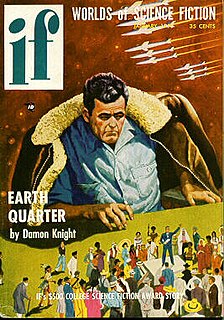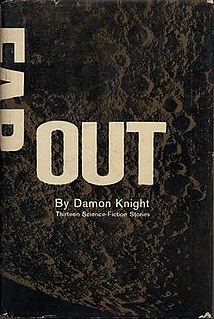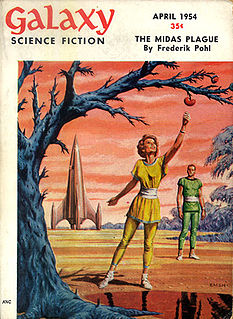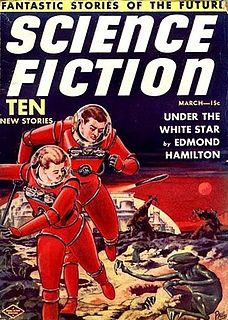Related Research Articles

Alfred Elton van Vogt was a Canadian-born science fiction author. His fragmented, bizarre narrative style influenced later science fiction writers, notably Philip K. Dick. He was one of the most popular and influential practitioners of science fiction in the mid-twentieth century, the genre's so-called Golden Age, and one of the most complex. The Science Fiction Writers of America named him their 14th Grand Master in 1995.

John Wood Campbell Jr. was an American science fiction writer and editor. He was editor of Astounding Science Fiction from late 1937 until his death and was part of the Golden Age of Science Fiction. Campbell wrote super-science space opera under his own name and stories under his primary pseudonym, Don A. Stuart. Campbell also used the pen names Karl Van Kampen and Arthur McCann. His novella Who Goes There? was adapted as the films The Thing from Another World (1951), Horror Express (1972), The Thing (1982), and The Thing (2011).

Damon Francis Knight was an American science fiction author, editor and critic. He is the author of "To Serve Man", a 1950 short story adapted for The Twilight Zone. He was married to fellow writer Kate Wilhelm.
Lester del Rey was an American science fiction author and editor. He was the author of many books in the juvenile Winston Science Fiction series, and the editor at Del Rey Books, the fantasy and science fiction imprint of Ballantine Books, along with his fourth wife Judy-Lynn del Rey.

Joe William Haldeman is an American science fiction author. He is best known for his novel The Forever War (1974). That novel and other works, including The Hemingway Hoax (1991) and Forever Peace (1997), have won science fiction awards, including the Hugo Award and Nebula Award. He was awarded the SFWA Grand Master for career achievements. In 2012 he was inducted as a member of the Science Fiction Hall of Fame. Many of Haldeman's works, including his debut novel War Year and his second novel The Forever War, were inspired by his experiences in the Vietnam War. Wounded in combat, he struggled to adjust to civilian life after returning home. From 1983–2014, he was a professor teaching writing at the Massachusetts Institute of Technology (MIT).

Robert Silverberg is an American author and editor, best known for writing science fiction. He is a multiple winner of both Hugo and Nebula Awards, a member of the Science Fiction and Fantasy Hall of Fame, and a Grand Master of SF. He has attended every Hugo Awards ceremony since the inaugural event in 1953.

The World of Null-A, sometimes written The World of Ā, is a 1948 science fiction novel by Canadian American writer A. E. van Vogt. It was originally published as a three-part serial in 1945 in Astounding Stories. It incorporates concepts from the General Semantics of Alfred Korzybski. The name Ā refers to non-Aristotelian logic.
Orbit was an American long-running series of anthologies of new fiction edited by Damon Knight, often featuring work by such writers as Gene Wolfe, Joanna Russ, R. A. Lafferty, and Kate Wilhelm, who was married to Knight. The anthologies tended toward the avant-garde edge of science fiction, but by no means exclusively; occasionally the volumes would feature some nonfiction critical writing or humorous anecdotes by Knight. Inspired by Frederik Pohl's Star Science Fiction series, and in its turn an influence on other original speculative fiction anthologies, it ran for over a decade and twenty-one volumes, not including a 1975 "Best of" collection selected from the first ten volumes.
This is a bibliography of works by Damon Knight.

Far Out is a collection of 13 science fiction short stories by American writer Damon Knight. The stories were originally published between 1949 and 1960 in Galaxy Magazine, If Science Fiction and other science fiction magazines. There is an introduction by Anthony Boucher.
"The Last Word" is a science fiction short story by American writer Damon Knight. It first appeared in the February 1957 issue of Satellite Science Fiction and has been reprinted twice, in Far Out (1961) and The Best of Damon Knight (1976).

"Special Delivery" is a science fiction short story by American writer Damon Knight. It first appeared in the April 1954 issue of Galaxy Science Fiction and has been reprinted a number of times, in Operation Future (1955), Far Out (1961), and The Best of Damon Knight (1976).
"Not with a Bang" is a science fiction short story by American writer Damon Knight. It first appeared in the winter 1949 issue of The Magazine of Fantasy and Science Fiction and has been reprinted a number of times, including in Far Out (1961), The Best of Damon Knight (1976), 50 Short Science Fiction Tales, and The Eureka Years (1982).
"You're Another" is a science fiction short story by American writer Damon Knight. It first appeared in the June 1955 issue of The Magazine of Fantasy and Science Fiction and has been reprinted a number of times, including in the 1961 collection Far Out.

"Time Enough" is a science fiction short story by American writer Damon Knight. It first appeared in the July 1960 issue of Amazing magazine and has since been reprinted twice, in Far Out (1961) and The Best of Damon Knight (1976).

"Thing of Beauty" is a science fiction short story by American writer Damon Knight. It first appeared in the September 1958 issue of Galaxy magazine and has been reprinted three times, in Far Out (1961), The Sixth Galaxy Reader (1962), and The Best of Damon Knight (1976).
"The Enemy" is a science fiction short story by American writer Damon Knight. It first appeared in the January 1958 issue of Venture magazine and has been reprinted twice, in the books Far Out (1961) and The Best of Damon Knight (1976).

Future Science Fiction and Science Fiction Stories were two American science fiction magazines that were published under various names between 1939 and 1943 and again from 1950 to 1960. Both publications were edited by Charles Hornig for the first few issues; Robert W. Lowndes took over in late 1941 and remained editor until the end. The initial launch of the magazines came as part of a boom in science fiction pulp magazine publishing at the end of the 1930s. In 1941 the two magazines were combined into one, titled Future Fiction combined with Science Fiction, but in 1943 wartime paper shortages ended the magazine's run, as Louis Silberkleit, the publisher, decided to focus his resources on his mystery and western magazine titles. In 1950, with the market improving again, Silberkleit relaunched Future Fiction, still in the pulp format. In the mid-1950s he also relaunched Science Fiction, this time under the title Science Fiction Stories. Silberkleit kept both magazines on very slim budgets throughout the 1950s. In 1960 both titles ceased publication when their distributor suddenly dropped all of Silberkleit's titles.

Cosmic Stories and Stirring Science Stories were two American pulp science fiction magazines that published a total of seven issues in 1941 and 1942. Both Cosmic and Stirring were edited by Donald A. Wollheim and launched by the same publisher, appearing in alternate months. Wollheim had no budget at all for fiction, so he solicited stories from his friends among the Futurians, a group of young science fiction fans including James Blish and C. M. Kornbluth. Isaac Asimov contributed a story, but later insisted on payment after hearing that F. Orlin Tremaine, the editor of the competing science fiction magazine Comet, was irate at the idea of a magazine that might "siphon readership from magazines that paid", and thought that authors who contributed should be blacklisted. Kornbluth was the most prolific contributor, under several pseudonyms; one of his stories, "Thirteen O'Clock", published under the pseudonym "Cecil Corwin", was very successful, and helped to make his reputation in the field. The magazines ceased publication in late 1941, but Wollheim was able to find a publisher for one further issue of Stirring Science Stories in March 1942 before war restrictions forced it to close again.

Nebula Award Stories 1965 is an anthology of science fiction short works edited by Damon Knight. It was first published in hardcover by Doubleday in 1966, with a Science Fiction Book Club edition following in October of the same year. The first British edition was published by Gollancz in 1967. Paperback editions followed from Pocket Books in the U.S. in November 1967, and New English Library in the U.K. in April 1969. The U.K. and paperback editions bore the variant title Nebula Award Stories 1. The book was more recently reissued by Stealth Press in hardcover in February 2001. It has also been published in German.
References
- ↑ Index to Science Fiction Anthologies and Collections
- ↑ Knight, Damon (1976), The Best of Damon Knight , Nelson Doubleday, New York